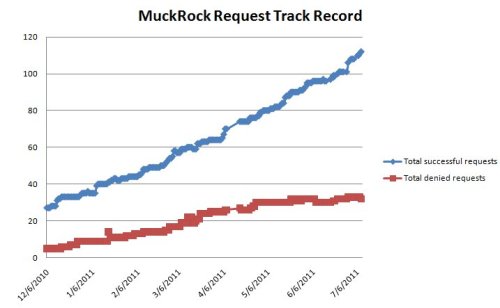I was shocked to read today that Aaron Swartz, one of our earliest and most active users, is facing federal charges of wire fraud, computer fraud and more and faces up to 35 years in jail, all for allegedly downloading, en masse, scientific journals through the JSTOR online service.
In a widely quoted statement, US Attorney Carmen Ortiz wrote:
“Stealing is stealing, whether you use a computer command or a crowbar, and whether you take documents, data, or dollars,” Ortiz said in a statement. “It is equally harmful to the victim whether you sell what you have stolen or give it away.”
While I have no direct or indirect knowledge of the circumstances around the alleged activity, Ortiz has not shown or given any evidence that Aaron did, in fact, sell or give away the materials he is alleged to have downloaded, nor has Ortiz indicated that the victim was, in fact, significantly harmed. JSTOR stated that the materials had been returned. Aaron turned himself in today and is, of course, presumed innocent until proven guilty.
What I do know, however, is that the U.S. Attorney’s Office made an interesting choice when picking high-profile examples to make of so-called hacking cases. Aaron has been a tireless advocate of open, accessible data, particularly public data for non-commercial purposes. He helped craft and launch, with Lawrence Lessig, the Creative Commons license, one of the few bright spots as the legal public data commons has, in many ways, shrunk in recent years to increased hard-line enforcement of copyright laws, extended copyright terms, stepped up enforcement and narrow views of fair use.
Aaron was also investigated for another incident in which he mass-downloaded data: Court records, which were accessed from a library and which were in the public domain.
He has also been an early and avid advocate for the work we’re doing at MuckRock, having previously requested his own FBI records under the Privacy Act. He’s one of our top requesters, with his requests’ success rate showing just how difficult it is to actually make public data public. And Aaron has shown his academic abilities, from analysis of Wikipedia authorship to writing published by IEEE.
Given all the above, and given that JSTOR has issued a statement indicating it had considered the matter more or less resolved, I have a hard time understanding the merits of the aggressive prosecution, particularly with 35 years of jail time for an aggressive advocate and pioneer of open and free speech in which no personal gain is indicated, nor significant loss shown. Aaron has tweeted that those wishing to support him should contribute to Demand Progress, a progressive non-profit he founded and was executive director of.
A reporter called me up from Politico and asked about Aaron’s involvement with MuckRock, particularly if he was involved in the day-to-day running of the site. I told the reporter he was just a user, but the truth is that Aaron, like many other members of our active community, are the real driving force of the site: Our marketing department, our sales group, our editorial board and more. He has been a ceaseless advocate for transparency and access, two bedrocks of our democracy.
Right now, the side of free speech and open data needs a lot more advocates like Aaron. We’re rooting for him.
This post was updated Wednesday July 20, 2011.
 Sorry for the jaggy graph, but the trends are pretty clear: We’re doing much, much better lately when it comes to getting requests actually answered, thanks to regularly tweaking the template system, the FOIA contact database and the suggested requests, as well as by deploying the new follow up tool.
Sorry for the jaggy graph, but the trends are pretty clear: We’re doing much, much better lately when it comes to getting requests actually answered, thanks to regularly tweaking the template system, the FOIA contact database and the suggested requests, as well as by deploying the new follow up tool.